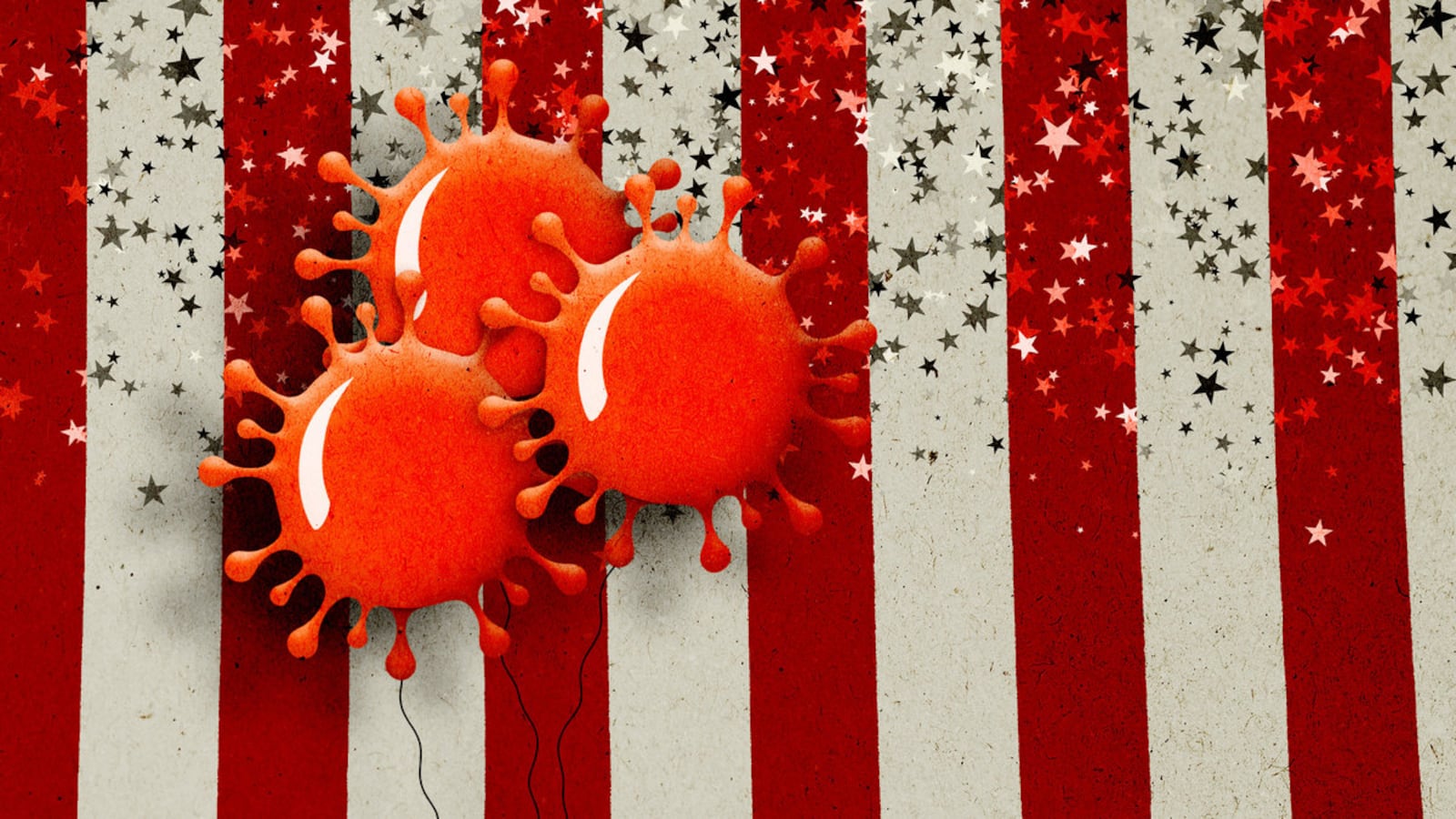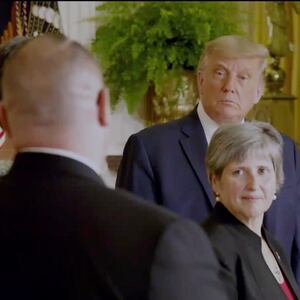Political conventions don’t often take place against the backdrop of a global pandemic that has claimed tens of thousands of American lives. But it is not unprecedented.
In the summer of 1992, the parties convened as the AIDS crisis was near its peak. The disease, like COVID now, was still a source of immense confusion and fright then. But it was also the subject of a burgeoning activist movement and the convention planners planned accordingly. Before Bill Clinton accepted the nomination in Madison Square Garden, two speakers infected with AIDS took the stage. One, Bob Hattoy, a friend of Clinton’s who had become an AIDS activist after he was afflicted with the disease, declared: “AIDS does not discriminate. But George Bush’s White House does.”
It was a groundbreaking moment, recalled Sean Strub, a long-time activist and writer who was friends with Hattoy. “I think it was inevitable that it would be addressed. It was not all inevitable that someone with HIV would be speaking.”
It was also a politically powerful one too. Two weeks later, when they convened in Houston, Texas, Bush and his fellow Republicans went to some length to make it clear that they were not downplaying the crisis. Mary Fisher, a Republican activist and the daughter of the campaign’s finance committee chair, spoke to the hall about her own battle with the disease. She held back very little.
“With the president’s leadership, much good has been done. Much of the good has gone unheralded, and as the president has insisted, much remains to be done,” Fisher declared. “But we do the president’s cause no good if we praise the American family but ignore a virus that destroys it.”
The choice of Fisher underscored the challenges in persuading Republicans to tackle AIDS. She did not fit the profile of those hardest hit by the virus—gay men—but, instead, allowed GOP lawmakers to talk about helping “innocent victim[s]” as Sen. Don Nickles called her. But looking back now, those who watched Fisher still see her speech as a turning point, not just because she humanized the AIDS crisis for many voters, but because she argued proactively that there was no longer a political upside in dismissing it.
“At that time, I didn't know I'd still be alive here now, talking to you,” Fisher, who is now an artist living in Arizona, said in a phone interview Wednesday with The Daily Beast. “I’m told it changed a lot of people’s view of the whole epidemic. And it made a lot of people more open to the idea that if it could happen to me, it could happen to them. To this day, I get emails about that.”
Twenty-eight years later, Fisher worries that there won’t be a similar moment of sober-minded reckoning. The current Republican convention is taking place amid a pandemic that has claimed more lives over a much shorter period of time than AIDS had done up to that point in 1992. But the toll taken by COVID-19 has been almost entirely absent from the programming.
More than 13,000 words of prepared remarks were sent out for the 18 speakers on the convention’s first night. Of those, just five were “coronavirus,” two were “virus,” 13 were “COVID,” and nine were “pandemic” (not including the phrase “coronavirus pandemic”). Of those 29 utterances, 17 of them came from Amy Ford, a registered nurse and Dr. G. E. Ghali, an oral surgeon. The other mentions had little to do with the disease at all. And while Trump himself held a discussion with COVID frontline workers, he used it to spread a variety of overly-positive disinformation about the virus and treatment of it.
The absence was even more pronounced on night two. More than 12,600 words of prepared remarks were sent out for 20 speakers. Of those, just three were “COVID,” two were “virus,” one was “coronavirus,” and four were “pandemic.” The one speech that did directly address the toll that the virus has taken was delivered by First Lady Melania Trump. But that was reportedly put together without the input or sign off of the president’s team—and, as such, was not included in the embargoed remarks sent to reporters. Absent that, the most notable line addressing COVID came from Trump’s top economic adviser Larry Kudlow, who referred to it in the past tense, the same day it had killed more than 1,100 Americans.
“Watching the convention, I hear nobody even talking about it,” Fisher remarked. “Or they’re saying that it is going swimmingly or that it happened already. I don’t understand that. I can’t understand that. It doesn’t compute. I can’t say it any other way. It just doesn’t compute.”
“I think we all have this sense that there is a magic bullet somewhere,” Fisher added. “There isn’t. We need to have patience and perseverance.”
For those who have worked in and around the president, the absence of COVID discussion isn’t much of a surprise. The president doesn’t care for gloominess when his resume is under discussion. And no trusted surrogate would be sane enough to trample on his preferred messaging.
“I don’t think that for any of these speakers, this is a subject they will touch,” said Sam Nunberg, a former Trump aide who knows what it’s like to incur his wrath. “It is the equivalent of talking about Bill and Hillary's marriage in the 96 convention. Why would you do it if you don’t have to?”
According to people with knowledge of the convention details, viewers shouldn’t expect the topic of the coronavirus to take on a bigger role in the final two evenings either. For many of Trump’s aides, top surrogates, and MAGA diehards, the less the virus and its horrific toll are talked about, the better. To them, the pandemic shouldn’t be given top billing at the four-day event, which they say is better suited for other subjects and conservative rallying cries.
“Our convention is forward-looking. People want to know what the country will look like after COVID,” said a source familiar with the convention planning. “The president has shown he can build an economy up and he’ll do it again.”
But simply programming your convention to other topics doesn’t make the surrounding reality no longer exist. A pandemic ravaging the country is still a pandemic, after all, even if it goes unmentioned in primetime. And for those who have planned conventions in the past, there is real risk that Trump is running by leaving the topic unaddressed.
In 2004, Republicans held their own convention in Madison Square Garden, this time not against the backdrop of a virus but of a terrorist attack that had targeted New York City and a war in Iraq that was starting to go south. On Monday night, they had the widow of a passenger from one of the 9/11 flights speak, along with the sister of a captain from a separate flight and a widow for a fireman who had rushed into the World Trade Center. Later, they had retired CENTCOM Commander Tommy Franks and a one-time mayor who had been, up to that point, held in high public regard: Rudy Giuliani.
Part of it was to play up George W. Bush’s perceived strength as a war-time president who had risen to the call of the terrorist attacks—bits of political biography that would soon become liabilities. But part of it was a simple calculation: You couldn’t hold a convention and act as if the turmoil, tragedy, and sacrifice around it didn’t exist.
“We used Monday night to talk about those challenges, knowing that if we didn’t do that, the story would be they are trying to hide away the enormous challenges happening in Afghanistan and Iraq,” said one of the ‘04 convention planners. “If you don’t talk about it, if you don’t have people representing those who have died then the news media will be talking about the fact that this is an administration trying to whitewash the horrificness of what’s going on on the battlefield.”
With reporting by Asawin Suebsaeng







